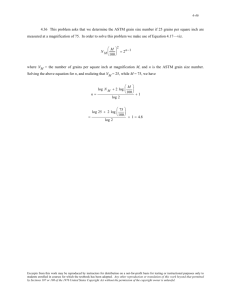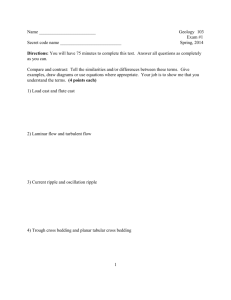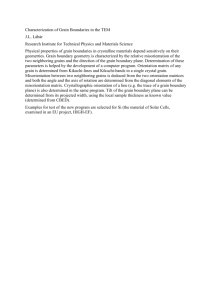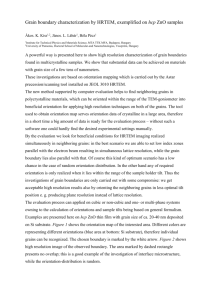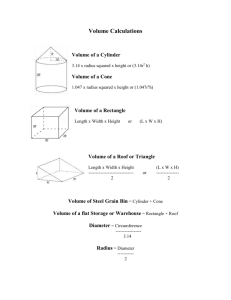Orleans Best Practices
advertisement
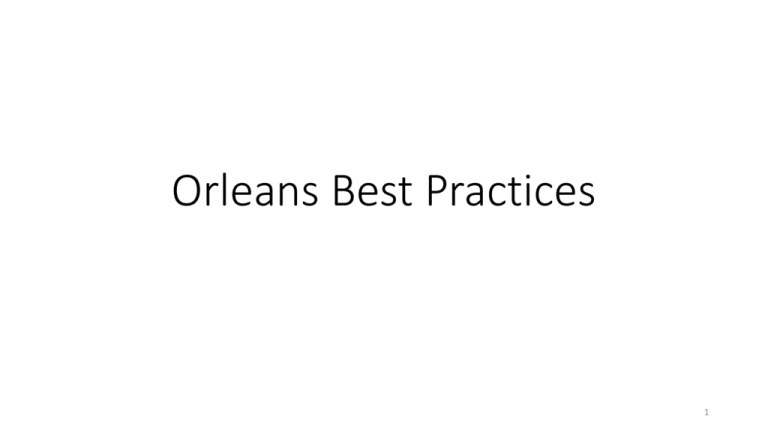
Orleans Best Practices 1 Agenda • Scenarios & General Fit • Designing Grains • Implementing Grains • Persistence • Deployment & Production Management • Logging & Testing • Troubleshooting 2 Scenarios & General Fit • Consider Orleans when you have • • • • • • Significant number of loosely coupled entities (hundreds to millions) Entities are small enough to be single-threaded Workload is interactive: request-response, start/monitor/complete Need or may need to run on >1 server No need for global coordination, only between a few entities at a time *Different entities used at different times • Problematic fit • • • • Entities need direct access to each other’s memory Small number of huge entities, multithreaded Global coordination/consistency needed *Long running operations, batch jobs, SIMD * it depends 3 Designing Grains • Actors are not object, although very similar • Loosely coupled, isolated, mostly independent • Encapsulate and manage their state independently from other grains • Can fail independently • Avoid chatty interfaces between grains • Message passing is much more expensive than direct memory access • If two grains constantly talk to each other, maybe they should be one • Consider size and complexity of arguments, serialization • Sometimes it’s cheaper to resend a binary message and deserializes it twice • Avoid bottleneck grains • Single coordinator/registry/monitor • Do staged aggregation if necessary 4 Implementing Grains -- Asynchrony • Everything has to be async (TPL), no thread-blocking operations • await is the best mechanism to compose async operations • Typical cases: • Return a concrete value: return Task.FromResult(value); • Return a Task of the same type: return foo.Bar(); • Await a Task and continue execution: var x = await bar.Foo(); var y = DoSomething(x); return y; • Fan-out: var tasks = new List<Task>(); foreach(var grain in grains) tasks.Add(grain.Foo()); await Task.WhenAll(tasks); DoMore(); 5 Implementing Grains • When to use [StatelessWorker] • Functional operations: decrypt, decompress, before forwarding for processing • Multiple activations, always local • E.g., good for staged aggregation (locally within silo first) • By default grains are non-reentrant • • • • • Deadlock in case of call cycles, e.g. call itself Deadlocks are automatically broken with timeouts [Reentrant] to make a grain class reentrant Reentrant is still single-threaded but may interleave Dealing with interleaving is error prone • Inheritance • Inheritance of grain interfaces is easy • Multiple grain classes implementing same interface may require disambiguation • Limited inheritance of grain classes • Declarative persistence breaks inheritance • Generics are supported 6 Grain Persistence Overview Orleans grain state persistence APIs are designed to provide extensible storage functionality with easy-to-use API. • Tutorial: https://orleans.codeplex.com/wikipage?title=Declarative%20Persistence&referringTitle=Step-by-step%20Tutorials Overview – Grain State Persistence • Define .NET interface extending Orleans.IGrainState containing fields to be included in grain’s persisted state. • Grain class should extend GrainBase<T> and adds strongly typed State property to the grain’s base class. • The first State.ReadStateAsync() will occur automatically before ActivateAsync() is called for a grain. • Grain should call State.WriteStateAsync() whenever they change data in the grain’s state object • Grains typically call State.WriteStateAsync() at the very end of grain method, and return the Write promise. • Storage provider _could_ try to batch Write’s for efficiency, but behavioral contract & config is orthogonal to storage API used by grain. • Alternatively grains might use timer to only write updates periodically. Application can decide how much “eventual consistency” / staleness it can allows – range from immediate / none to several minutes. • Each grain class can only be associated with one storage provider. • The particular provider to use for a grain defined with [StorageProvider(ProviderName=“name”)] attribute. • Silo config file needs <StorageProvider> entry in silo config file with corresponding name -- see tutorial above for example. • Storage provider may be composite provider, Example: ShardedStorageProvider 7 Storage Providers Built-in Storage Providers • All built-in storage providers live in the Orleans.Storage namespace from OrleansProviders.dll. • MemoryStorage is ONLY for debug / unit testing – Data stored in-memory with no durable persistence • AzureTableStorage stores data in Azure table storage • Configure with Azure storage account info + optional DeleteStateOnClear [hard vs soft delete] • Data stored in binary format in one Azure table cell using efficient Orleans serializer. Data size limit == max size of Azure table column == 64KB binary data. Community contributed code extends to use multiple table columns, for overall max 1MB. • ShardedStorageProvider writes data across a number of underlying storage providers, based on grain id hash. • Usage example: https://orleans.codeplex.com/discussions/546730 Storage Provider Debug Tips • Turn on TraceOverride Verbose3 logging in silo config file for built-in storage providers to get much more info about what is happening with storage operations. • LogPrefix=”Storage” for all providers, or specific type using “Storage.Memory” / ”Storage.Azure” / “Storage.Shard”. • Can use Fiddler to debug & optimize REST API calls to/from Azure storage. http://t.co/JV8N7fgW5k Dealing With Failure of Storage Operations • Either grains or storage providers can await storage operations and retry any failures if desired. • If unhandled, failure will be propagated back to caller / client as a broken promise. • No concept currently of activations getting destroyed automatically if storage operation fails [except initial Read] • Built-in storage providers do not retry failing storage operations by default. 8 Grain Persistence – Hints & Tips Grain Sizing • For throughput, usually better to use many smaller grains than few large grains, but overall best to choose grain size & types based on application domain model, Example: Users, Orders, etc External Changing Data • Grain can re-read current state data from underlying backing storage using State.ReadStateAsync() This is good way to force “resync” with underlying DB changes. • Alternately, grain can use a timer to re-read data from backing storage periodically, based on suitable “staleness” decisions for an application. Example: Content Cache grain. • Adding / Removing Fields • Storage provider in use will determine effects of adding / removing additional fields from persisted state. • Due to no-schema, Azure table storage should automatically adjust to extra fields, but best to test thoroughly! Writing Custom Storage Providers • Storage providers are a major extensibility point for Orleans, and easy to write. • Tutorial: https://orleans.codeplex.com/wikipage?title=Custom%20Storage%20Providers&referringTitle=Step-bystep%20Tutorials • Storage API contract for grains driven by the GrainState API – Write/Clear/ReadStateAsync() • Storage behavior contract defined by storage provider, typically configurable. Example: Batch Write’s, Hard vs Soft Delete, etc 9 Cluster Management • Orleans automatically manages cluster liveness • • • • Worker roles (silo) may fail and join at any time Orleans membership handles all automatically Silo instance table for diagnostics Tunable configuration options: more aggressive vs. more lenient failure detection • Failures are the norm, can happen any time • • • • Lost grains will be automatically reactivated In-process grain calls will fail or timeout Orleans provides best effort message delivery Any network message can be lost, should be retried by application code if important (usual practice is to retry end to end from the client/front end). • Currently no graceful shutdown • Azure upgrade/reboot is treated as node failure 10 Deployment & Production Management • Service monitoring • Utilize info provided by Orleans • • • • Windows perf counters Compact Azure metrics table Very detailed Azure statistics table. Watch for specific log events in Trace • Add your own perf counters • Scaling out and in • Monitor your SLA, utilization • Add/remove instance • Orleans automatically rebalances and takes advantage of the new HW • Version management • No in-place code upgrade, have to restart the silo • If the change is backward compatible, can restart silos one by one, e.g. Azure upgrade • Otherwise have to restart the whole deployment • Azure VIP swap vs. downtime • Beware of storage accounts when two deployments are running in parallel • Fully stop old deployment before starting the new one or be idempotent 11 Logging & Testing • Logging, tracing & monitoring • • • • • Use GrainBase.GetLogger() that exposes Info(), Warn(), Error(), Verbose() By default output goes to .NET Trace along with Runtime traces, to local file Easy to consume by Windows Azure Diagnostics Can install your own log consumer via Logger.LogConsumer.Add() Can override default trace levels for grains or runtime components; • <TraceLevelOverride LogPrefix="Application" TraceLevel=“Verbose" /> • <TraceLevelOverride LogPrefix=“Runtime" TraceLevel=“Warning" /> • Testing • Will publish UnitTestBase class for easy unit testing • Starts two (or more) silos in app domains and a client in the main app domain • Simplifies version of what we use internally 12 Troubleshooting • Logs, logs, logs: silo logs, client (frontend) logs • WAD may or may not pick up the logs in case of startup failures • RDP to the machines to be sure • Use Azure Table-based membership for development/testing • Works with Azure Storage Emulator for local troubleshooting • OrleansSiloInstances table shows state of the cluster • Use unique deployment IDs (partition key) for simplicity • Silo doesn’t start • • • • Look at OrleansSiloInstances – did the silo register there? Is firewall open for TCP ports 11111 & 30000 (by default, can change in config)? Look at the log, there’s an extra one for startup errors RDP to the server or Worker Role instance and try to start it manually • Client (frontend) can’t connect to silo cluster • • • • Has to be in the same hosted service as silos Look at OrleansSiloInstances – are there silos (gateways) registered? Look at the client log – does it find gateways listed in OrleansSiloInstances table? Look at the client log – can it connect to one or more gateways? 13 Questions? 14
